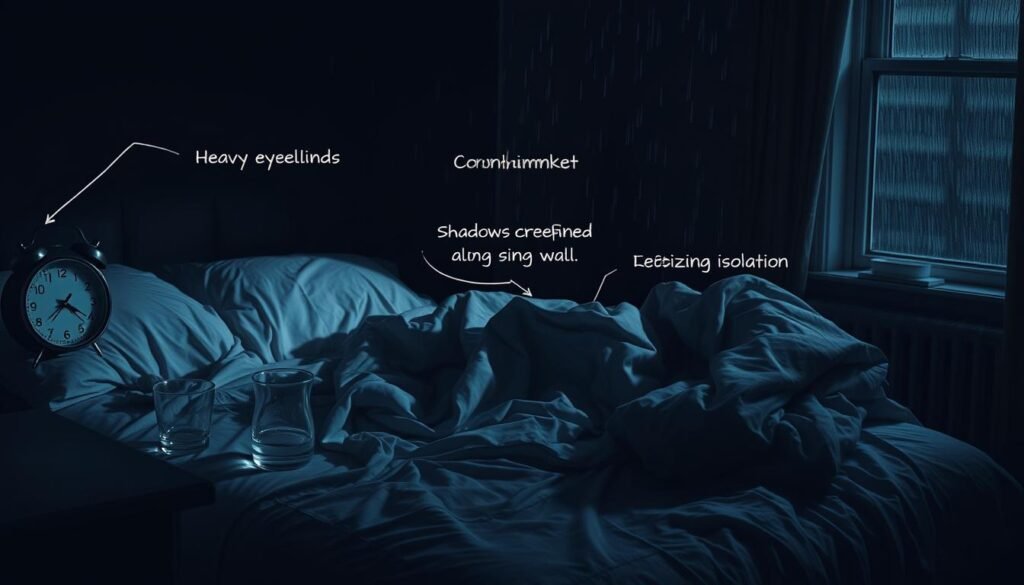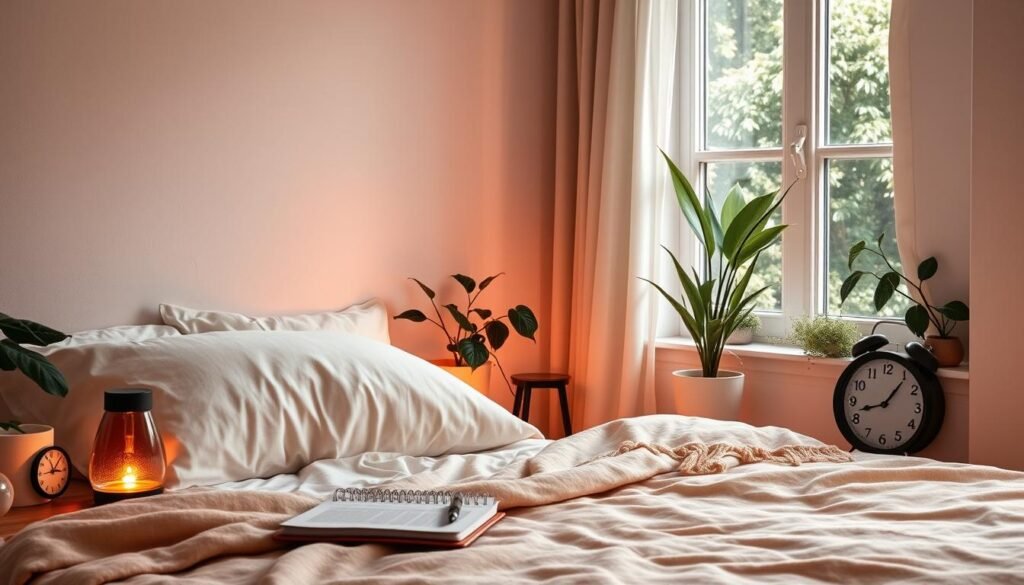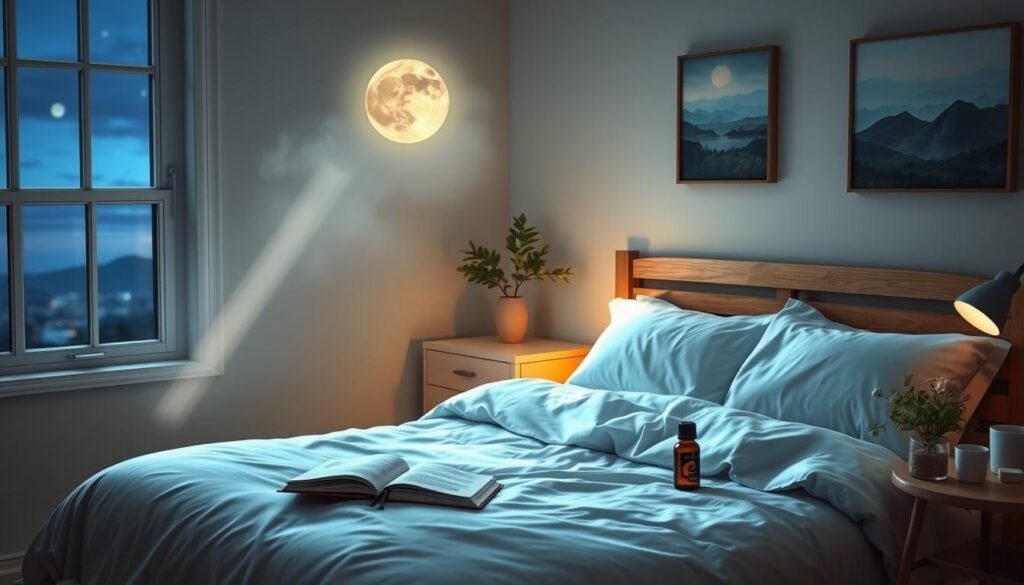Did you know that people with insomnia are ten times more likely to suffer from depression? This fact highlights how sleep problems and emotional health are closely linked, especially with depression symptoms. Waking up during the night is not just annoying but can also point to serious mental health concerns.
Many who feel depressed find it hard to sleep well. About 75% have trouble either falling or staying asleep. This problem can lead to a harmful cycle. Poor sleep can make depression symptoms worse and cause unstable emotions. Knowing that waking up at night could mean depression is key for those who haven’t made the connection to their mental health.
There are ways to deal with these sleep issues that can make your sleep and mood better. To understand more about morning depression and its impact, visit this detailed resource. It’s important to know how sleep affects mental health to get the right help.
Key Takeaways
- Waking up at night can show signs of depression.
- People with sleeping problems are much more likely to get depressed.
- Not sleeping well can lead to feeling emotionally out of balance.
- Seeing sleep patterns helps in understanding mental health better.
- Dealing with sleep issues can improve your mood and lessen depression.
- Focusing on better sleep is crucial for overall mental well-being.
Understanding the Connection Between Sleep and Depression
The tie between sleep and depression matters a lot. Not getting enough sleep can make depression worse. Studies show that up to 80% of people with depression struggle with insomnia. This can lead to a vicious cycle that harms sleep quality and mood.
About 40% of people with insomnia also have clinical depression. Insomnia can also make it more likely for someone to get depression for the first time. This shows how important sleep is in avoiding and fighting mood disorders.
Men and women may experience sleep and depression differently. Many women feel more emotional symptoms like sadness. Seasonal affective disorder (SAD) shows how things like less sunlight can affect sleep and mood. Knowing these differences helps in treating these conditions better.
To better sleep and mood, some strategies can help. Using psychotherapy with medication usually works well. Exercise, especially in the morning, can improve sleep and lessen depression. Taking short naps and getting sunlight can also help regulate emotions and sleep.
Understanding how sleep and mood affect each other can lead to better health. Treating sleep problems and mood disorders together can really improve someone’s life.
Common Sleep Disturbances Linked to Depression
Common sleep disturbances often go hand in hand with depression. Insomnia is a big issue, affecting up to 88% of people with major depressive disorder. Terminal insomnia makes people wake up too early and not get back to sleep. It can make depression worse and hurt mental health even more.
About 27% of those with major depressive disorder suffer from hypersomnia. It’s not talked about much, but it can really affect your life. It leads to more tiredness and makes daily tasks hard.
Sleep apnea is also a big problem for those with depression, affecting around 20%. It messes with your breathing at night and makes you wake up a lot. If you have sleep apnea, you’re five times more likely to get depressed than someone without it.
These statistics show how sleep problems and mental health are connected. Insomnia makes you three times more likely to get depressed. Bad sleep can come before depression starts, and feeling down can ruin your sleep. The cycle between insomnia and depression makes both issues worse.
It’s important to know about these common sleep disturbances to better handle mental health issues. Catching and dealing with these problems early can help improve health and productivity.
Waking Up in the Middle of the Night a Sign of Depression
Waking up at night often goes hand in hand with depression. This creates a cycle that can harm emotional health. Sleep issues can make you feel hopeless and easily irritated. This makes handling your feelings harder. Knowing how sleep disturbances and mental health are linked is key.
How Night Awakenings Relate to Depression Symptoms
Studies show that those who often wake up at night may be more likely to get depressed. Difficulty falling asleep, staying asleep, or waking up too early is common with depression. Thinking too much at night can increase anxiety and sadness. People with sleep apnea may find their mood worsens due to tiredness.
The Psychological Impact of Sleep Issues
Not sleeping well really affects your mind. Higher IL-6 levels, an inflammation chemical, can make you feel emotionally down in the morning. Lack of sleep triggers stress hormones like cortisol, making you wake up in a bad mood. Changes in sleep patterns with the seasons show how our body clocks and moods are connected.
Identifying Depression Symptoms Beyond Sleep Issues
Knowing how depression affects life is important. It’s not just about trouble sleeping. It can also change how you feel and act, hurting your happiness and health.
Key Emotional and Mental Signs
Depressed people often feel very sad or hopeless. They get easily upset and lose interest in their favorite activities. This can make someone’s mental health worsen. In the U.S., over 20 million people struggle with depression. It affects their daily lives and how they interact with others. For more on depression’s impact and how to manage it, look at this resource.
Physical Manifestations of Depression
Depression isn’t just an emotional issue; it has physical effects too. People might feel tired, eat more or less, and find daily tasks hard. These signs show how our minds and bodies connect, highlighting the need to care for both. About a third of adults have trouble sleeping. Many feel the effects for a long time, worsening their depression. Knowing how these issues link is key for better treatment.

The Bidirectional Relationship Between Sleep and Mood Disorders
The link between sleep and mood disorders is complicated. It goes both ways. Bad sleep can lead to mood disorders, especially depression. In fact, around 90% of those with depression struggle to sleep well. This makes it hard to tell which problem comes first. Each problem can make the other worse.
One in three adults show signs of insomnia, showing how common sleep issues are worldwide. Insomnia greatly increases the risk of depression. People with ongoing insomnia are much more likely to get depressed. This shows we need to tackle both problems together.
The pandemic has made things even tougher. Over half of Americans had trouble sleeping during it, especially those aged 35-44. With more anxiety and depression, it’s vital to focus on sleep. Better sleep can improve mood in those suffering from mood disorders.
Good sleep is crucial. Adults should get 7-9 hours a night, says the American Academy of Sleep Medicine. Keeping a regular sleep schedule and a good sleeping space helps a lot. Eating well also helps with sleep. This shows how overall health is key to dealing with sleep and mood problems. To learn more, check out this detailed article.
| Factor | Impact on Sleep | Impact on Mood Disorders |
|---|---|---|
| Sleep Disturbances | Increased insomnia symptoms | Higher risk of depression |
| Depression | Decreased sleep quality | Exacerbation of mood symptoms |
| Pandemic Stress | Greater sleep disturbances | Increased anxiety and depression rates |
| Sleep Hygiene Practices | Potential improvement in sleep | Reduction in depressive symptoms |
Sleep Hygiene Practices to Improve Sleep Quality
Improving your sleep hygiene can make a big difference in your mental health. A soothing bedtime routine helps your body get ready for deep sleep. These steps can help you sleep better and lower your stress and anxiety.
Establishing a Relaxing Bedtime Routine
To get a good night’s sleep, start with a calming evening routine. Here are some tips:
- Consistent sleep schedule: Sleeping and waking up at the same time every day keeps your body’s clock on track.
- Wind-down activities: Try reading, meditating, or gentle stretching to tell your body it’s time for sleep.
- Avoid stimulants: Stay away from caffeine and nicotine before bed.
- Technology detox: Cut screen time one hour before bed to avoid the blue light that keeps you awake.
The Role of Environment in Sleep Quality
The right bedroom setting improves your sleep. Here are some things to consider:
| Environmental Element | Recommended Settings |
|---|---|
| Temperature | Cool, typically between 60-67°F |
| Lighting | Keep it dark, using blackout curtains or an eye mask |
| Noise Level | Keep it quiet, use white noise machines if needed |
| Bedding Quality | Choose a comfortable mattress and pillows that you like |
Good sleep hygiene practices can greatly improve how well you sleep. People with good sleep habits have less daytime sleepiness and fewer signs of depression. Setting up a good bedtime routine and a nice sleep space can boost your sleep and mental health.

When to Seek Help from a Medical Professional
Knowing when to get help from a doctor is key to recovering from depression and sleep troubles. If you often feel hopeless, deeply sad, and can’t sleep well, see a doctor. It’s vital to recognize these signs to take care of your mind.
Depression shows differently in older adults, sometimes as numbness instead of sadness. They might feel more lonely and isolated, making depression worse. If signs like losing interest in hobbies or changing sleep habits last over two weeks, it’s important to talk to a doctor.
Encouraging someone to see a doctor is an important step in tackling mental health problems. Helping with making doctor’s appointments can truly help. Studies show early help during doctor visits can lower the chance of suicide in the future.
For those dealing with depressive disorders, recognizing symptoms like anxiety, sleep problems, and feeling worthless is crucial. Luckily, in the U.S., the 988 Suicide & Crisis Lifeline offers 24/7 professional help.
In short, dealing with depression symptoms and consulting a doctor are critical for proper diagnosis and treatment. Talking about sleep issues and emotional pain is key to mental well-being. For more info, check out insights on sleep disorders and mental health.
Treatments for Depression and Their Effect on Sleep
Treatments for depression are vital for improving sleep issues often seen in those with depression. Sleep problems and depression have a complicated link. Knowing the different treatments helps a lot with overall health.
Cognitive Behavioral Therapy and Insomnia
Cognitive Behavioral Therapy (CBT) is known for its success in treating insomnia linked to depression. It changes bad thought patterns and actions causing poor sleep. Many studies have shown that CBT helps people sleep better and feel less depressed. Using relaxation methods learned in CBT can reduce stress and enhance sleep quality.
Medication Options and Their Sleep Effects
Depression medicines affect sleep in different ways. SSRIs and SNRIs, common antidepressants, usually improve mood over time. But, they might disrupt sleep at the start. Sedating antidepressants like doxepin help with insomnia. Doctors need to find the right balance between treating depression and sleep issues when prescribing these medications.

| Treatment Type | Effect on Sleep | Additional Notes |
|---|---|---|
| Cognitive Behavioral Therapy | Improves sleep quality and reduces insomnia | Focuses on changing negative thought patterns |
| Antidepressants (SSRIs) | May disrupt sleep initially | Can enhance mood over time |
| Tricyclic Antidepressants | Often improves sleep due to sedating effects | Effective for treating insomnia |
| Relaxation Techniques | Enhances sleep quality when practiced regularly | Can be integrated into therapy sessions |
| Medication Monitoring | Required to evaluate sleep disturbances | Adjustments may be necessary based on patient response |
Healthy Lifestyle Changes to Enhance Both Sleep and Mood
Changing your lifestyle can greatly improve your sleep and mood. Being active for 30 minutes a day makes you feel better. This exercise not only lifts your spirits but also helps you sleep better.
A good diet is key for your mind. Eating fresh foods and lean meats boosts your energy and mood. It’s crucial to stay away from drugs and alcohol, as they can make anxiety worse. Cutting down on caffeine and alcohol can also help you sleep better.
Getting sunlight helps set your body clock, improving sleep and mood. Regular sun exposure keeps your natural sleep-wake cycle steady. Also, sleeping and waking up at the same time every day helps you sleep better.
Managing stress is important for your mood. Try writing in a stress journal or doing relaxing activities. Creating a calming bedtime routine and having a comfortable bedroom help you sleep well.
Napping early in the afternoon is okay but don’t nap too late. It can mess with your nighttime sleep. If sleep problems persist, seeing a sleep expert is a good idea.
Sleep is very important for managing mood issues. A study in benefits of slumber shows that a regular sleep schedule helps your mental health. By making these healthy changes, you can improve your sleep and mood.
Conclusion
The link between sleep and depression is vital for mental health. Waking up often at night can point to depression. Problems like insomnia and anxiety mess up sleep and show deeper issues.
Early notice of these problems is key. It shows where help is needed.
Studies tell us that screens before bed and what we eat hurt sleep. A good sleep setting and habits help us sleep better. Solutions for night sweats, indigestion, and anxiety help us sleep well and boost mental health.
Sleep issues are serious. Getting help can make sleep and mental health better. Knowing how sleep and depression connect helps us develop better sleep habits. This leads to better emotional balance.